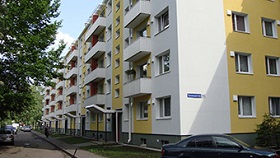Construction, Estonia, Good for Business, Investments, Real Estate
International Internet Magazine. Baltic States news & analytics
Friday, 19.04.2024, 05:39
Estonian govt approves long-term building renovation strategy
 Print version
Print version |
|---|
The strategy is a part of Estonia's national energy and
climate plan, spokespeople for the government said.
Prime Minister Juri Ratas said that the state must
aim to improve the living and working conditions of 80% of Estonia's residents
by renovating said environments into nearly zero-energy buildings.
"It would mean healthier and higher quality living and
working environments, and overall also lower living costs. Half of our energy
consumption is attributable to Estonia's building stock, therefore, improving
people's living conditions also has a significant role in meeting our climate
ambitions," Ratas said.
The premier noted that the implementation of the strategy
must also include Estonian researchers and experts, and be supported by the
state.
The analysis carried out during the drafting of the strategy
showed that altogether 54 mln square meters of existing building space needs to
be renovated by 2050, including 100,000 residential buildings, 14,000 apartment
buildings and 27,000 non-residential buildings, all of which should achieve at
least energy efficiency class C.
In order to meet this goal the current yearly volume of
reconstruction work would need to increase fivefold.
Minister of Economic Affairs and Infrastructure Taavi Aas
said that meeting this goal requires large investments.
"On the one hand, the state can stimulate it, but it is
important that as large a share of it as possible should be done at the
initiative of and financing by owners of the property," he said.
Aas said that there are currently several bottlenecks to
building renovations.
"Sadly, the focus is currently not sufficiently on both
improving energy efficiency as well as on the sustainability of buildings, and
many property owners simply lack the financial capability to achieve class C
energy efficiency," the minister noted.
In order to overcome said bottlenecks, the strategy proposes
to employ state funded financial mechanisms in the form of loans, guarantees
and support, but also the introduction of new technologies, information
measures as well as research and development.
In addition to the support measures, the strategy also
proposes to create supplementary services through the state credit foundation
Kredex in order to significantly increase the volume of housing investments and
to enable the inclusion of private partners.
The long-term strategy for building renovation was
commissioned by the Ministry of Economic Affairs and Communications and carried
out by the Tallinn University of Technology in relation to the transposition of
the EU directive on the energy performance of buildings into national law.
The strategy will be presented to the European Commission
for the first time in 2020, and subsequently as part of the energy and climate
plan by Jan. 1, 2029, and in every ten years after that.
- 28.01.2022 BONO aims at a billion!
- 26.08.2021 LLC Dizozols Investments finalizes investment attraction deal with Crowdestor with record-high profits
- 13.02.2021 Моя жизнь в газете. Очерки по новейшей истории Латвии. Глава 1
- 25.01.2021 Как банкиры 90-х делили «золотую милю» в Юрмале
- 30.12.2020 Накануне 25-летия Балтийский курс/The Baltic Course уходит с рынка деловых СМИ
- 30.12.2020 On the verge of its 25th anniversary, The Baltic Course leaves business media market
- 30.12.2020 Business Education Plus предлагает анонсы бизнес-обучений в январе-феврале 2021 года
- 30.12.2020 EU to buy additional 100 mln doses of coronavirus vaccine
- 30.12.2020 ЕС закупит 100 млн. дополнительных доз вакцины Biontech и Pfizer
- 29.12.2020 Linde Gas открывает завод в Кедайняйской СЭЗ








 «The Baltic Course» Is Sold and Stays in Business!
«The Baltic Course» Is Sold and Stays in Business!

